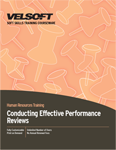Course outline for
Conducting Effective Performance Reviews
Conducting Effective Performance Reviews Course Outline

How to Use This Guide
Session One: Course Overview
Session Two: Performance Appraisals Done Well
What are Performance Appraisals?
Making Connections
Building Trust
Session Three: Errors We Make
Three Slippery Areas
Making Connections
Session Four: Types of Performance Reviews
Choosing What Works
Winning Performance Appraisals
Session Five: The Performance Management Process
The Four Steps
Sample Performance Appraisal Forms
Session Six: Goals with SPIRIT
Identifying Dreams and Setting Goals
My Dreams and Goals
Putting it All Together
Session Seven: The Performance Management Cycle
The Four Phases
The Basis for Review
Session Eight: Setting Standards
Session Nine: Creating a Performance Development Plan
Session Ten: Feedback and Communication
Session Eleven: Listening Skills
Active Listening
The Mission: To Listen
Session Twelve: Communication Strategies
Basic Skills
Probing
Non-Verbal Messages
Interpretation Exercise
Session Thirteen: Giving Feedback
The Importance of Feedback
Six Characteristics
Case Studies
Session Fourteen: Accepting Criticism
Session Fifteen: Planning the Interview
Session Sixteen: The Interview
A Basic Format
Preparation
Session Seventeen: Goal Setting Role Play
Session Eighteen: Providing Feedback
Session Nineteen: Coaching
The Importance of Coaching
Task Preparation
Session Twenty: Appraisal Preparation
Session Twenty-One: The Interview
Session Twenty-Two: Maintaining Performance
Session Twenty-Three: Handling Performance Problems
Make the Commitment
Behavior Contracts
Recognizing Mrs. Stanford
Session Twenty-Four: The Part Where Someone Gets Fired
If You Have To Let Them Go…
Role Play
Session Twenty-Five: Pre-Assignment Review
Session Twenty-Six: Performance Management Checklists
Recommended Reading List
Post-Course Assessment
Pre- and Post-Assessment Answer Keys
Personal Action Plan
Download this course as a demo
Complete the form below and we'll email you an evaluation copy of this course:
Video
More Course Outlines in this Series
- Understanding and Coping with the COVID-19 Pandemic
- Anger Management: Understanding Anger
- Building Better Teams
- Business Succession Planning: Developing and Maintaining a Succession Plan
- Conducting Effective Performance Reviews
- Conflict Resolution: Getting Along In The Workplace
- Creating a Top-Notch Talent Management Program
- Managing Customer Service
- Closing the Generation Gap in the Workplace
- Employee Dispute Resolution: Mediation through Peer Review
- Hiring for Success: Behavioral Interviewing Techniques
- Onboarding: The Essential Rules for a Successful Onboarding Program
- Orientation Handbook: Getting Employees Off to a Good Start
- Performance Management: Managing Employee Performance
- Stress Management
- Public Relations Boot Camp
- Appreciative Inquiry
- Transgender Employees: Creating an Inclusive Work Community
- Employee Recognition: Appreciating Your Workforce
- Cannabis and the Workplace
- Creativity in the Workplace
- Problem Solving and Decision Making
- Accounting Skills for the New Supervisor
- Change Management: Change and How to Deal With It
- Diversity, Equity, and Inclusion
- Unconscious Bias
